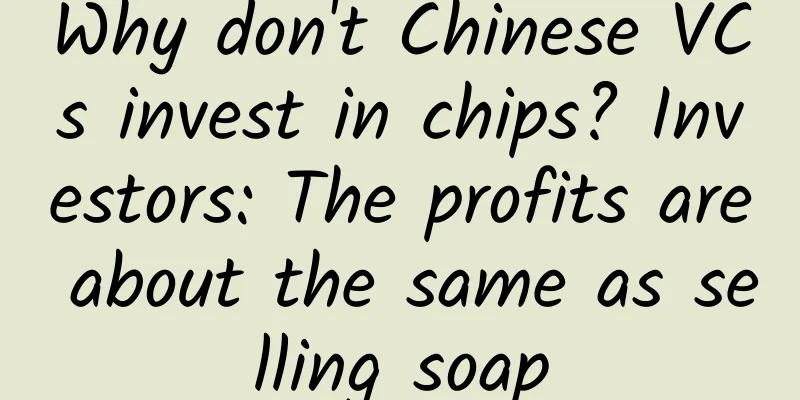Why don't Chinese VCs invest in chips? Investors: The profits are about the same as selling soap

|
"Why don't Chinese VCs invest in chips?" This is the most frequently asked question to investors recently. However, two years ago, Li Feng, the founding partner of Frees Capital, thought about this issue. At that time, he got the answer from his peers: "This is not what VCs should invest in." The reason was that in the previous cycle, people who invested in chips basically did not make any money. The US sanctions on ZTE have once again brought the current development status of the chip and semiconductor industries to the public's attention. According to statistics from the China Semiconductor Industry Association, the value of domestic integrated circuit imports in 2017 was US$260.1 billion, making it my country's largest imported commodity. Capital is always profit-seeking, but few people are interested in the "big cake" of the chip market. Compared with the domestic excessive pursuit of business model innovation, why has technological innovation not received enough attention? The profit from investing in chips is about the same as that from selling soap. "It's not that Chinese VCs don't invest in chips. We have invested in several of them before and lost all our money." At the 2018 ChinaVenture Group Annual Meeting, Zhu Xiaohu, managing director of GSR Ventures, which had invested in popular companies such as Didi, Ele.me, and ofo, responded to outside doubts. Zhou Zhixiong, executive partner of Kaixuan Venture Capital, lamented that investing in the chip industry and maintaining a professional team requires a lot of money, but the returns are among the lowest among all categories. "The opportunities in the Chinese market are huge, but the challenges are even greater." Regarding the current status of chip investment, all investors mentioned the following points: high investment cost, high threshold, long cycle, and low return rate. Therefore, Zhang Suyang, former partner of IDG Capital and founder of Volcano Capital, called on the public to understand the VC industry. "Capital is profit-seeking, this is a realistic problem, I think this is beyond reproach," he said. He believes that many things on the market are easier to generate returns and profit margins than chips. As long as this phenomenon persists, there will still be few people investing in chips, which is a matter of choice for normal commercial companies. In addition, chip investment is either a success or a failure, unlike some business model innovations, which can be changed immediately if they fail. At the same time, VCs prefer to invest in projects that can generate greater demand and recover money faster, "while in the chip field, the profit is similar to that of selling soap. This situation will affect business investment behavior." What are the difficulties in chip investment? Whether or not to invest in chips is controversial in the industry, and the difficulties in investing in chips is a topic of concern in the industry. "Most of China's chip companies are single-product companies with large initial investments and short life cycles. In the long run, the investment and returns are disproportionate." In addition to the above difficulties, Zhu Xiaohu believes that there is another difficulty in investing in chip technology: in the medium term, any large industry is cyclical, and when any large new platform emerges, the first to emerge are hardware companies. Looking back at history, there were Intel, IBM, and Cisco in the PC era, and Nvidia in the AI era. Once chip investment forms a platform, it is difficult for new companies to start. Zhu Xiaohu emphasized, "Especially chip companies have very large initial investments. If competitors take advantage of the first move to occupy the market, after the equipment costs are amortized, the cost curve of latecomers lags far behind competitors and cannot compete with them, unless they rely on large subsidies and support from the government." Yang Lei, managing director of Northern Light Venture Capital, explained from an industry perspective, "The difficulty of chip investment is that the industry chain is very long and the process is very complicated. The cost of a single tape-out can be as high as several million dollars." In addition, there are labor costs. It is understood that capable chip engineers need at least five years of training, and the training fee starts at one million US dollars. At the same time, it takes at least 18 months for a team to make a chip. Despite the above problems, Zhou Zhixiong believes that there are great opportunities for chip investment in China now, because the application of chips is in China. Zhu Xiaohu also stated that Jinshajiang Venture Capital has also invested in one or two companies. When a project becomes popular, countless similar projects will be copied immediately, and funds will flow into the field in a large amount in a short period of time, and the chip field is no exception. "Now so many people are working on chips, it feels a bit like a great leap forward." Yang Xiaodong, former president of Fidelity Investments China, expressed his concerns. He is not optimistic about the investment environment at present because everyone is rushing to do this. What should the chip industry do? "This market has become one where there are more people than money, and in the short term, this will continue." Hao Dan, chairman of Shenzhen Hengtai Huasheng Asset Management Co., Ltd., revealed that semiconductor projects have been priced at a premium of 1 to 2 times. The investment market has seen a "chip fever", and entrepreneurs have begun to flock into the chip field. However, unlike business model startups, technology innovation companies have higher barriers to entry, especially in the high-tech, asset-heavy chip industry. "It is not difficult to make a chip, but it is very difficult to make a high-performance chip, and it is even more difficult to achieve a product yield of more than 95%." Yang Lei, managing director of Northern Light Venture Capital, believes that a chip company needs at least 20 million US dollars to gain a foothold. Below 20 million US dollars, everyone competes with money, and above 20 million US dollars it depends on each company's ability. At the same time, for high-tech companies, even if they have sufficient funds, it is difficult for a founder who is not sure about the product to lead the company. Yang Lei reviewed Northern Light Venture Capital's hard technology investment and concluded that there is a huge gap between technology and real industrial applications. "We also made the mistake of being obsessed with academics at the beginning: now we prefer established teams that have truly experienced the industry." Where are the investment opportunities in chips? Zhu Xiaohu believes that China still has opportunities in artificial intelligence chips, but once chip investment forms a platform, it will be difficult for new companies to start. "Because if your competitors take the lead and occupy the market, after amortizing the equipment costs, you will not be able to compete because the cost curve is far behind your competitors, unless you rely on massive government subsidies and support." Based on the above viewpoints, DaoCloud co-founder Chen Qiyan believes that chips are heavy asset investments, and both private and state-owned enterprises face huge financial risks when investing, and there is no talent aggregation effect. "So the investment in these things often requires national will." "We need to build our own industry ecosystem." Yang Xiaodong, former president of Fidelity Investments China, believes that the development of the industry should not rely too much on the government. He called on the country to provide soil for growth in terms of taxation and intellectual property rights, and at the same time give money to entrepreneurs through VCs instead of university professors, so that VCs can discover people who want to change the world. As a winner of Toutiao's Qingyun Plan and Baijiahao's Bai+ Plan, the 2019 Baidu Digital Author of the Year, the Baijiahao's Most Popular Author in the Technology Field, the 2019 Sogou Technology and Culture Author, and the 2021 Baijiahao Quarterly Influential Creator, he has won many awards, including the 2013 Sohu Best Industry Media Person, the 2015 China New Media Entrepreneurship Competition Beijing Third Place, the 2015 Guangmang Experience Award, the 2015 China New Media Entrepreneurship Competition Finals Third Place, and the 2018 Baidu Dynamic Annual Powerful Celebrity. |
<<: The paradox of assisted driving takeover, how can autonomous driving come to the rescue?
Recommend
What should the TV industry do in the future when it is stuck in the quagmire of closed-door development? The mobile phone industry has given the answer
Under heavy pressure, TV manufacturers have resor...
How to operate KOL influencer marketing?
As more and more brands use internet celebrities ...
Nobel Prize winner got this counterintuitive phenomenon wrong, but NBA star got it right
Almost every basketball player, coach or fan beli...
Revealed! Why are more and more young people having gray hair?
Follow "Body Code Decoding Bureau" (pub...
From which angles should we plan the timing of operational activities?
To determine the goal of an activity, it is neces...
Golden title writing skills for new media operations!
The public account I currently operate is in a ve...
Every drop of alcohol you drink is damaging your brain!
【Written at the end】 In 2018, a study in The Lanc...
Growth hacker Dong Shiyi's short video underlying practical logic course
Growth Hacker Dong Shiyi·Short Video Bottom-level...
The Fantastic Journey of Sinus Cancer: A Battle with the "Microcosmos"
Have you ever wondered what secrets are hidden in...
Why do we still get scared when watching horror movies even though we know it’s all acting?
【Written at the end】 In primitive environments, f...
The latest news on the fourth dose of the new coronavirus vaccine: Is it out? When to fight?
The antibody resistance of the new coronavirus va...
Analyze user retention from user motivation!
At the current stage, the cost of acquiring custo...
Information flow promotion optimization strategy, do this well to achieve 80% success!
Seeing the world through our eyes is an innate ab...
Saved it! A complete collection of commonly used auxiliary tools for APP promotion!
Some people say that App promotion is hard work. ...









